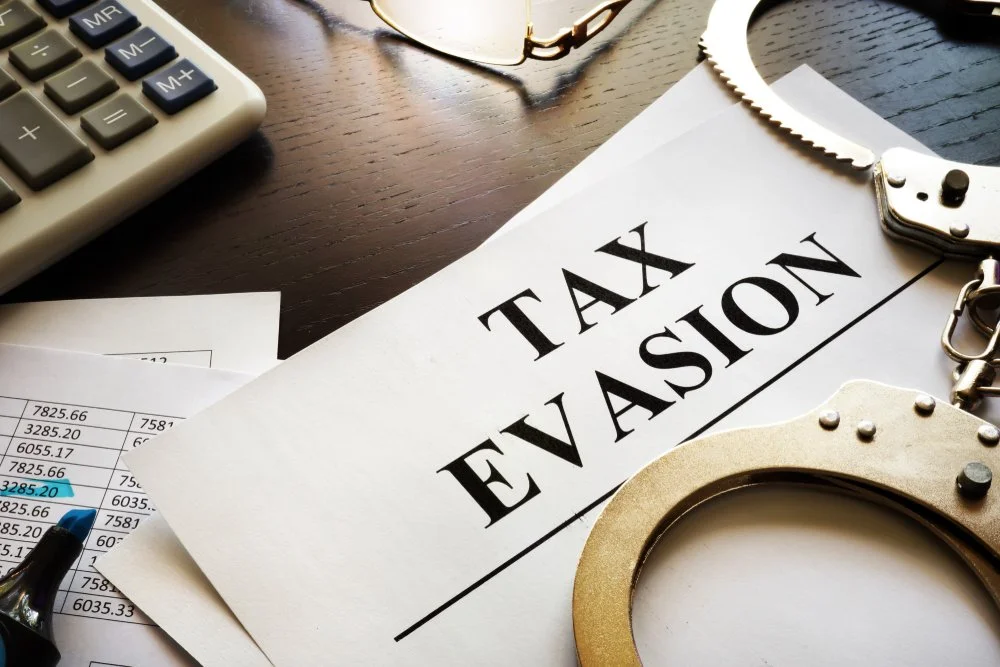“At any time during 2021, did you receive, sell, send, exchange, or otherwise acquire any financial interest in any virtual currency?” asks the IRS on the front page of the 1040 form every American completes.
This simple yes or no question clearly indicates that the IRS has gotten increasingly serious about getting the taxes from cryptocurrency profits.
In fact, in February of 2022, the IRS released some revisions that impact their voluntary disclosure form. This form allows tax evaders to report information to the IRS before getting into trouble.
Are you wondering about cryptocurrency and taxes? How does the IRS tax crypto, and what should you do if you answer yes to their crypto question? Will the IRS seek to prosecute you for tax evasion if you don’t report cryptocurrency?
Read on for our complete guide on the IRS and cryptocurrency, and then learn more about some famous tax evaders.
What Is Cryptocurrency?
Let’s start with a basic understanding of cryptocurrency or crypto, as it’ll make more sense why this is a challenging issue for the IRS.
Crypto is a digital currency that users seek through their computers. The computer works to solve complex puzzles. This is done to verify the authenticity of transactions on the network. When the puzzle gets solved, users are awarded newly minted crypto.
The most common cryptocurrencies include:
- Bitcoin
- Ethereum
- Tether
- Binance Coin
- XRP
- Solana
Most cryptocurrencies are supported by blockchain, which is a unique technology that maintains a tamper-resistant record of transactions and who actually owns the cryptocurrency.
Why Is Cryptocurrency More Challenging to Tax?
Because blockchain creates this tamper-resistant record of transactions, it makes it very challenging to find and verify for the IRS. It also doesn’t work the way traditional money currencies work.
Cryptocurrency started as a techie niche interest. The techies spent time mining, and it was almost like a game. Suddenly, and at a relatively quick rate, that game became worth trillions.
The real problem is the decentralized crypto market, unlike our traditional money. When you have dollars, you buy something; you sell something; it’s a pretty straightforward calculation for taxes, whether it’s a gain or a loss.
There is no central organization with crypto, making it more challenging to account for things like income, profit, or loss.
How Is Cryptocurrency Taxed?
Because of the blockchain and the inability to see it as centralized, the IRS doesn’t treat cryptocurrency the same way it treats money. Instead, it treats it like a stock, like a piece of property.
So, the IRS expects you to report cryptocurrency like you would any other type of property. When you sell, trade, or dispose of cryptocurrency and see a gain from it, you’re expected to pay taxes on that gain.
The IRS doesn’t tax you when you buy crypto, hold it, or even see gains from it. When they want it reported is when you sell the cryptocurrency.
How Should You Report Cryptocurrency to the IRS?
If you have sold cryptocurrency during the last tax year, the IRS does expect you to report it on your taxes. When you complete Form 1040, you will also need to use Form 8949.
The IRS will expect you to report your crypto for the following two reasons:
- Buying cryptocurrency, then selling it for a profit in a taxable account
- Using cryptocurrency as an exchange for goods and services
If the goods and services you get in exchange for the crypto are worth more in value than what you paid, you would need to report it.
To report this, you would first answer yes to the question at the top of the form on 1040. Then you would use Form 8949 to declare.
What Is Form 14457 From the IRS?
The IRS has Form 14457, called the IRS Voluntary Disclosure Practice Preclearance Request and Application.
This is the form the IRS asks you to use when you wish to make a voluntary disclosure to them about something that you had previously not declared but should have declared.
This form comes in two parts. You must complete the first part and send it to the IRS to see if you’re eligible to use the voluntary disclosure practice before completing the second part.
Once you receive a preclearance notification from the IRS, then you can complete and submit Part II. The IRS does state that just because you submit the form for preclearance doesn’t automatically mean you will get the go-ahead to do the voluntary disclosure.
What Changes Did the IRS Make to Form 14457?
Form 14457 has become particularly more significant in recent months because of revisions the IRS made to the IRS voluntary disclosure program.
It’s no surprise considering their current focus on cryptocurrency that these changes relate to disclosing crypto information.
Form 14457 now has an expanded section that specifically relates to the reporting of digital currency.
This form becomes significant for those who deal in digital currency and haven’t disclosed the currency because it’s the IRS giving you a sort of last chance to claim what you should claim and get yourself into compliance with the law.
What Makes This IRS Update Noteworthy?
In just the last few years, the IRS has taken a much greater and significant interest in cryptocurrency. Up until the most recent update, the IRS had said they wanted and expected digital currency to be reported.
However, making revisions to Form 14457 and clearly stating that the IRS was doing those revisions in an effort to let those dealing in digital currency to make the voluntary disclosure is noteworthy.
It tracks with the idea that the IRS is serious about pursuing cryptocurrency and will treat it like tax evasion if you don’t report cryptocurrency transactions.
Evading Taxes With Crypto
There are some experts who question the voluntary disclosure form and whether it’s fair for the IRS to ask individuals to identify themselves.
In fact, the 2021 National Taxpayer Advocate Annual Report was sent to Congress with questions about asking taxpayers to identify themselves. Does it put them at risk?
The Taxpayer Advocate Service (TAS) raised similar concerns about whether completing a voluntary disclosure raises your risk of criminal prosecution allowing Revenue Agents broad penalty discretion.
Nevertheless, the new changes in Form 14457 have addressed many of the concerns raised in these reports. The simple reality is that the IRS gets the money they feel is due to them. And it’s clear they plan to treat those using digital currency who don’t report it as tax evaders.
Famous US Tax Evaders
Nobody likes the idea of paying or owing more taxes to the IRS at the end of the tax year. When tax season rolls around, it’s not uncommon to start looking for those write-offs.
In the case of some of the most famous tax evaders, it’s obvious they chose to not tell the IRS the whole story on their finances. Let’s take a look at the story behind some of the most famous of those tax evaders who tried to outsmart the IRS.
Al Capone
When you consider famous tax evaders, Al Capone’s name is usually at the top of the list.
While Al Capone was guilty of many nefarious acts as a Chicago gangster, it was the IRS who finally got him behind bars with five counts of tax evasion in 1931.
Law enforcement had tried any number of ways to catch Capone and lock him. It was the IRS who could actually prove he wasn’t paying taxes on what he should have taxes on.
Walter Anderson
Walter Anderson is considered as one of the most notorious of tax evaders for the scope of his crime. As an entrepreneur and tech giant, Anderson methodically hid money in offshore accounts using a plethora of aliases.
The IRS eventually caught up with him when he had built up a whopping $200 million tax bill to the federal government and the District of Columbia.
His tax antics are widely considered the biggest tax evasion case in history. Finally, when he couldn’t hide anymore, he was convicted and owed the IRS a whopping $400 million in back taxes and penalties.
Joe Francis
Joe Francis of Girls Gone Wild fame has a long history of tussles with the law. While he purports his innocence and that his business is legitimate, his long history with the law would suggest otherwise.
While he makes millions on his franchise of business, he was in trouble with the IRS dating back to 2007, where he was charged with two counts of tax evasion. The IRS claimed he made false deductions and owed a whopping $20 million in back taxes.
He blamed his accountant but still could have faced some serious jail time. He eventually settled with a misdemeanor charge of filing a false return and bribery.
Wesley Snipes
Wesley Snipes was accused of taking some liberties and not filing his taxes at all for several years. He was accused of owing the IRS a whopping $7 million in back taxes.
He was eventually convicted on multiple misdemeanor counts. In 2010, he filed an appeal and the case was retried, and he lost again. This landed him in jail for three years at McKean Federal Correctional Institution in Pennsylvania.
Eventually, he was under house arrest in 2013 and was moved out of prison and forced to stay in his house through the end of his sentence.
Leona Helmsley
Leona Helmsley, dubbed the “queen of mean” by most who knew her, openly addressed her disdain for paying taxes. In fact, she often felt she was above the law and shouldn’t be required to pay taxes like poor people.
She was accused of owing $1.7 million in back taxes to the IRS. She fought this in trial and many of her employees actually testified against her. Eventually losing, she served 18 months in federal prison, one month in a halfway house, and two months on house arrest.
Willie Nelson
Willie Nelson spent some years not paying taxes until the IRS finally caught up with him. He was slapped with a suit claiming he owed $16.7 million in back taxes.
While he took some responsibility for the bill, his attorney managed to negotiate his bill down significantly to $6 million.
Nelson didn’t have the money to pay the IRS, and remember, the IRS always gets their money. Nelson went to work and released some music aptly titled The IRS Tapes: Who’ll Buy My Memories?
All proceeds from the sale of the music went to paying off the IRS. He also sued his accountant and used those funds toward his bill.
Get Help With Your Crypto Questions
While the world of digital currency may have started as a techie passion, it’s grown into a market worth trillions. The IRS intends to get their share of the money from those crypto gains.
Now that the IRS has a stated interest in making sure that those who deal in digital currency are disclosing it on their taxes, you might need some help with your taxes.
Let one of our experienced tax attorneys help you avoid getting into trouble with the IRS. Let them guide you through what you need to know and how to handle your cryptocurrency with the IRS.
You want to do the right thing and avoid a potential audit because of your cryptocurrency.
Crypto and the IRS, Tax Situation of the Future
You know the saying, there are two things guaranteed in life: death and taxes. Now that the IRS has a focused interest in digital currency, it seems likely they plan to pursue any who doesn’t properly disclose it as tax evaders.
Avoid ending up in an audit or in a legal battle with the IRS over your cryptocurrency transactions. Work with one of our qualified tax attorneys to get your questions answered and your taxes filed correctly.
Contact us today to get started addressing your questions about your taxes and digital currency.





